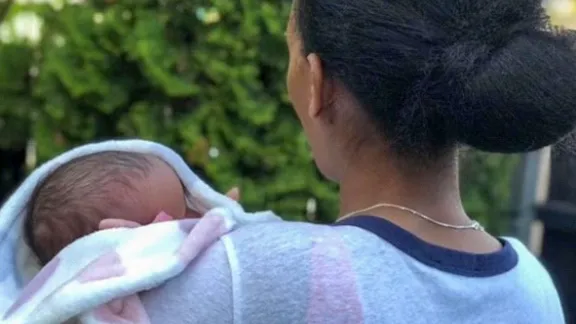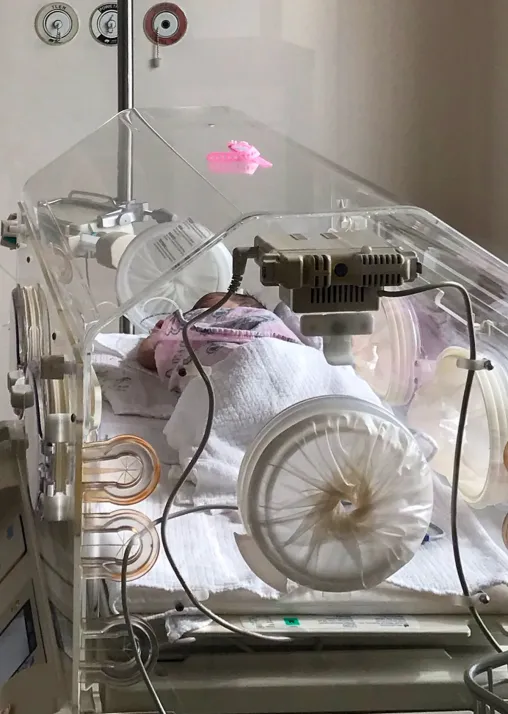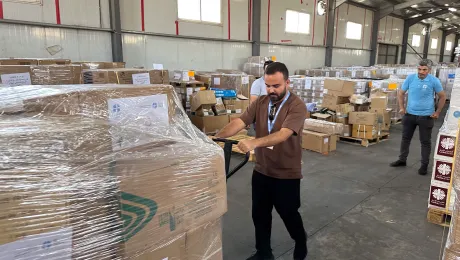
Eritrean woman with her newborn baby, who was picked up in the border area after giving birth in Białowieża Forest. Photo: Egala
LWF’s local partner organization provides prompt and comprehensive assistance
(LWI) - The young woman the case workers received on a cold night in April 2024 was Eritrean. She had spent more than a month in the forest of the Poland-Belarus border and had just given birth to a baby girl.
"The night was cold; the mother wrapped the newborn baby in her blouse. Border guards heard her cry for help and took the mother and her newborn to the hospital in Hajnówka," reads the report that the team of Polish organization Egala, later submitted. The newborn was placed in an incubator and later transferred to a children's hospital. The mother received material aid and psychosocial and legal assistance and now awaits the outcome of her asylum procedure. Egala is a local partner of The Lutheran World Federation (LWF) in Poland.
Volunteers responded

The baby was placed in an incubator and later transferred to a children’s hospital. The intervention likely saved her life. Photo: Egala
The woman and her child are two of almost 1,000 lives saved in April and May 2024 with LWF's support in the border area from Poland to Belarus. LWF Poland has been able to support Egala, which provides critical services to migrants along the Poland-Belarus border through field interventions – 351 in April and May alone, benefitting more than 900 migrants from countries such as Afghanistan, Eritrea, Ethiopia, Somalia, Syria, Yemen, and others.
The people seeking asylum in Europe started arriving in large numbers in 2021. They had flown to the Belarus capital Minsk, with fake visas and were told they would be safe. As the numbers grew, Polish authorities instructed border guards to push people back across into Belarus and told residents to report any new arrivals to the police. As the story made news headlines, many volunteers and non-governmental organizations coordinated humanitarian aid and support for those hiding in the forest. Among the first responders were members of Grupa Granica, a grassroots movement created to respond to the border crisis. LWF's partner Egala is a member of that movement.
Complex situation
Ms Oliwia Hurley, head of Egala, says the situation on the Polish-Belarusian border is tense and complex. This year's humanitarian crisis appears more severe than in the same period last year. Since April, there has been a significant increase in the number of patients admitted to hospitals," she says.
"Individuals arrive daily, day and night, requiring prompt and comprehensive support. Patients are often physically exhausted, and communication is difficult due to language barriers. Many newly arrived people are malnourished. Some have stayed five months in the forest and repeatedly tried to cross the border without success." According to the local partner organization, people report experiencing harsh conditions on the Belarusian side, including being pressured to cross into Poland and instances of being beaten by authorities.
LWF's partner provides food, water, and other essential non-food items like blankets, shoes etc. They also offer first aid, counseling, and legal support, including assistance with the asylum procedure. The organization also collects personal narratives, like the story of the young mother from Eritrea, to document backgrounds and instances of unlawful actions by authorities for advocacy purposes.
Challenging work
Work for migrants in the border area is difficult, and humanitarian assistance remains heavily restricted. Activists and humanitarian workers must operate discreetly to avoid legal repercussions, further marginalizing those in need. Despite these challenges, Egala continues to play a vital role in addressing the humanitarian needs of migrants at the Poland-Belarus border, ensuring they receive the essential care and support they urgently require.
The young mother from Eritrea has been on the road for many years, looking for a safe place to live. "She lived in refugee camps in Ethiopia, Kenya and Uganda. Her path was marked by suffering, hardship, and loneliness. She stayed in the Belarusian forest for over a month and was pushed back twice from Poland to Belarus by the border guard," the report by Polish NGO Egala says.
Neither Egala nor LWF Poland can say whether the mother from Eritrea can stay in Poland and raise her little girl. "Now the young Eritrean woman and her daughter are safe and cared for, hoping for a peaceful future in Poland," Egala's report reads.
LWF Poland’s work with Egala at the Belarus border area is funded by ELCA and Kerk in Actie.


